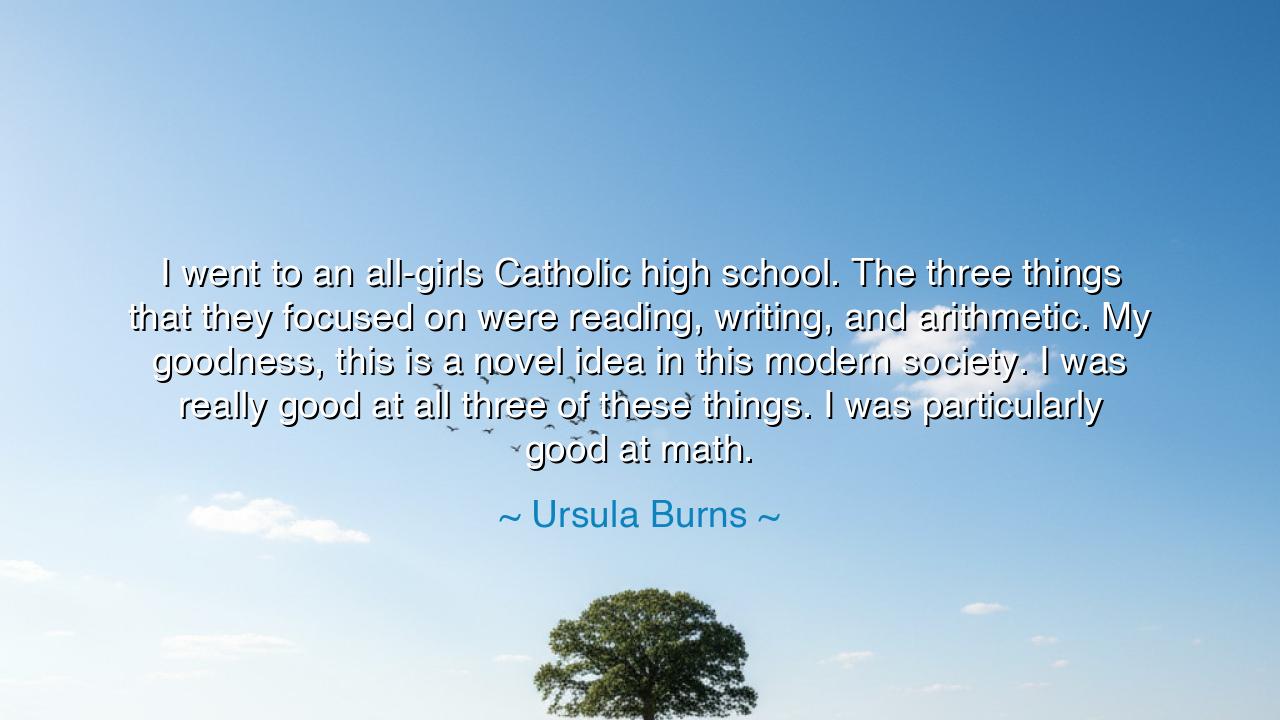
I went to an all-girls Catholic high school. The three things
I went to an all-girls Catholic high school. The three things that they focused on were reading, writing, and arithmetic. My goodness, this is a novel idea in this modern society. I was really good at all three of these things. I was particularly good at math.






In these words of Ursula Burns, the first Black woman to become CEO of a Fortune 500 company, there echoes not merely the story of one student’s schooling, but the ancient and enduring cry of civilization itself: that the path to strength is built upon the stones of reading, writing, and arithmetic. She recalls her days in an all-girls Catholic school, a place that might have seemed ordinary, yet it was hallowed by the discipline of clear thought and sacred labor. And she proclaims with awe and a hint of lament: “My goodness, this is a novel idea in this modern society.” For what should be the foundation of all societies—the mastery of the word, the pen, and the number—has grown dim in an age enamored with distractions.
Consider, then, the trinity of knowledge she names: reading, to drink from the streams of wisdom; writing, to shape thought into permanence; and arithmetic, the language of reason itself. These are not trivial skills, but the pillars of empires and the lamps that lit the Renaissance. In invoking them, Burns is not simply telling her story; she is sounding a warning that we live in times that forget the eternal laws of learning. Her gift in mathematics, in particular, was no idle talent, but a weapon sharpened to cut through barriers in an industry dominated by men.
History itself gives us many witnesses to the power of these three. Recall the young Hypatia of Alexandria, daughter of a mathematician, who mastered numbers, stars, and the turning of the heavens. By her reading she absorbed the wisdom of Plato; by her writing she guided generations; and by her arithmetic she revealed the harmonies of the cosmos. Though her life was tragically taken, her legacy endures as a testament to how the ancient triad of learning can kindle both greatness and fear in the hearts of men. Ursula Burns stands in the same lineage, inheritor of that ancient torch.
And yet, her words also cut deep into the modern heart. For she names it “a novel idea”—that society should value its young enough to root them in the basics of wisdom. Have we not traded the eternal for the fleeting? In place of patience, we exalt speed. In place of substance, we adore image. To hear her say that what was once obvious is now strange is to feel the tremor of decline. But she speaks not with despair, but with the quiet heroism of one who has walked the path and proven its power.
Her triumph—rising from the streets of New York to the seat of Xerox’s highest office—was not born of luck, but of discipline. The training of her mind, first in the humble classrooms of Catholic sisters, gave her the mastery to solve, to lead, to command respect. So too with Caesar, who sharpened his tongue with rhetoric before conquering Gaul, or Abraham Lincoln, who, with little more than a borrowed Bible and an arithmetic book, rose from frontier poverty to guide a nation. The pattern is ancient, and it remains unbroken: those who master the basics rise.
Let us, then, draw forth the lesson: in a world of shifting trends, cling fast to the eternal disciplines. Read daily—not only the fleeting news of the age, but also the wisdom of sages and poets. Write—not merely for display, but as an act of sharpening your own mind, making your thoughts clear as steel. And practice arithmetic—not only in numbers, but in all forms of logical reasoning, so that your judgments are sound and your choices measured. These are not chores, but rituals of power.
The ancients would say: “If you would be mighty, first master yourself.” Ursula Burns has shown us the path. Her quote is not nostalgia, but commandment. In her life, we see that the ordinary training of a child can arm a woman to break through glass ceilings and alter the course of history. So too, whoever reads these words must ask: are you attending to the basics, or are you drifting in the noise? Begin today. Pick up a book. Write your reflections. Challenge your mind with numbers. For in these humble acts lies the seed of greatness, and perhaps even destiny.






AAdministratorAdministrator
Welcome, honored guests. Please leave a comment, we will respond soon